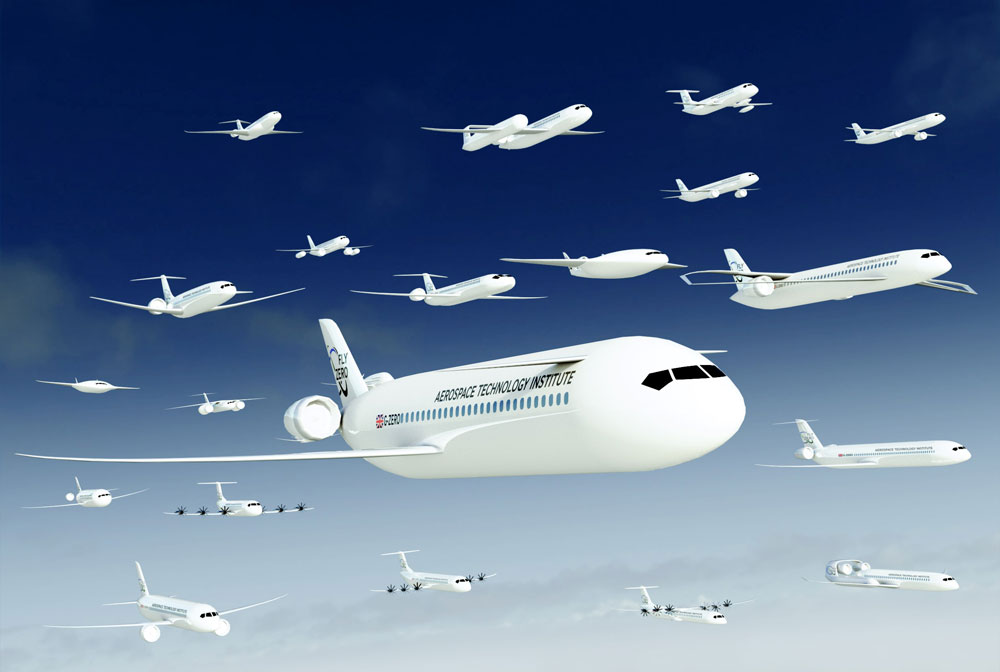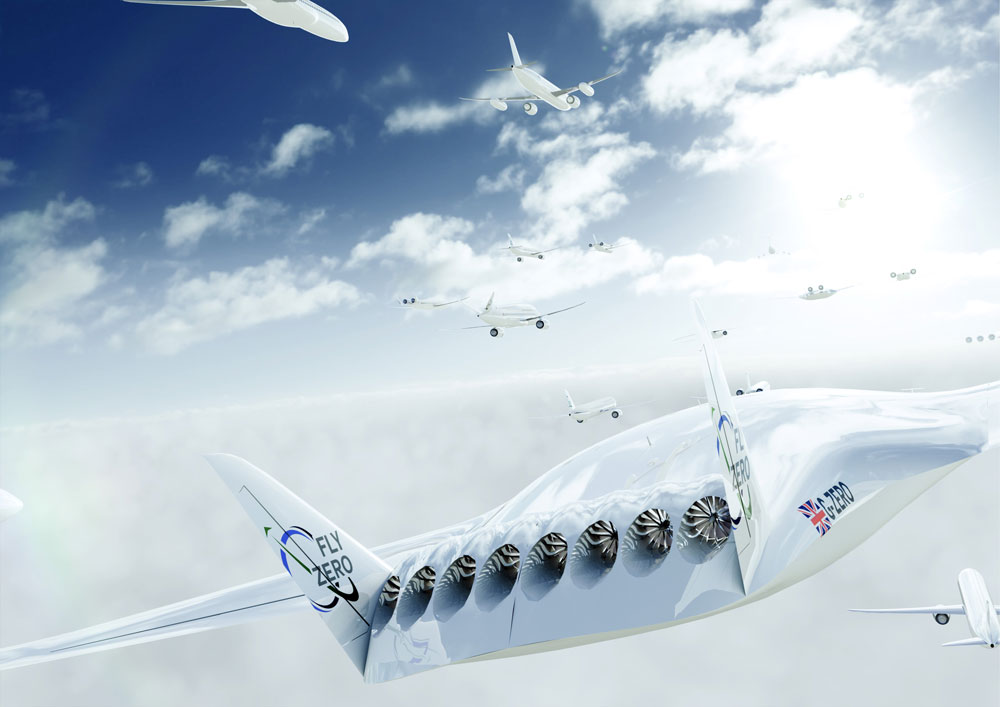AIR TRANSPORT ATI FlyZero initiative
Flying the carbon free way
A team of UK experts has been working to outline designs and requirements for the next generation of zero-carbon commercial aircraft. NATHAN HARRISON from the Aerospace Technology Institute explains the ambitious FlyZero project.
 ATI
ATI
After recovery from Covid-19, reducing greenhouse gas emissions is widely regarded as the biggest and most urgent challenge facing the aviation sector. While sectors, such as automotive and rail, transition to electric, finding alternative fuels which meet the requirements for aviation is altogether more difficult.
However, that is the challenge being undertaken by the Aerospace Technology Institute’s FlyZero project, which is setting out not to reduce carbon emissions but to realise zero-carbon emission commercial flight by 2030.
The project is funded by the UK government to February 2022, by which time the team will have delivered three zero-carbon emission concept aircraft designs, together with the manufacturing demands, industrial roadmaps and assessments of their sustainability and economic credentials.
Made up of engineers, aircraft designers, systems specialists, pilots, airspace experts and others from across the UK aerospace sector, including Airbus, Rolls-Royce, GKN Aerospace, Spirit AeroSystems, GE Aviation and easyJet to name a few, the FlyZero team represents a cross-section of aviation capability in the UK. Bringing this mix of specialists together to take an independent look at the future of zerocarbon emission flight is expected to help unlock the advanced technologies needed to propel the next generation of aircraft into our skies.
Leading the team of 90 is industry veteran Chris Gear, who spent five years as Chief Technology Officer for GKN Aerospace before retiring. Gear said: “The ambition of the FlyZero challenge was just too tempting not to come out of retirement and, having assembled a world-class team of experts who have the ability to shape the future of aviation, the project remains a very exciting prospect.”
The pressure is on as Jet Zero and Green Ships feature in the UK government’s ten-point plan for a green industrial revolution while, earlier this year, the UK’s Sixth Carbon Budget incorporated the UK’s share of international aviation and shipping emissions for the first time. Analysis by the Climate Change Committee showed that aviation comprised 7% of UK greenhouse gas emissions in 2018, of which international aviation made up 93%.
Adding to the challenge is the requirement for remote working brought on by the pandemic. When FlyZero was announced in Summer 2020, recruiting and onboarding the team 100% remotely may have seemed unlikely but Gear says it has been a success. “I’d be lying if I said I didn’t sense frustration from the team at long days on their laptops and virtual workshops but the work so far reflects the team is overcoming this challenge to work collaboratively and explore the boundaries of novel technologies.”
As a result of the pandemic the full FlyZero team is yet to meet in person and is instead utilising Microsoft Teams and Office 365 to support digital collaboration, including through daily stand-ups, workshops, report-outs and full team meetings.
The scope of the project from propulsion to policy and supply chain to operations means FlyZero is also bringing in expertise from specialist organisations across the UK through subcontracting opportunities and working with UK universities to commission specialist research and development in areas, such as contrail avoidance, hydrogen combustion and sustainable cabin design.
Naresh Kumar, Head of Sustainability said: “Zero-carbon emissions is non-negotiable for FlyZero. However, we also want to push the boundaries of what’s possible in terms of reducing other emissions, such as NOx x and noise while also creating the most sustainable aircraft possible from a manufacturing, materials and end-of-life perspective.
“The UK has a rich history of aerospace innovation and world-leading research universities and we’re aiming to bring these together to develop the zerocarbon emission aircraft technologies of the future.”
 ATI
ATI
In 2019, jet fuel represented 10% of global oil demand, according to the International Energy Agency. When you factor in forecasted passenger growth of around 4% per year, the scale of the challenge to produce, distribute and refuel using an alternative zerocarbon emission fuel becomes apparent.
The challenge of these alternative fuels or energy sources is also well recorded with stable storage and distribution of hydrogen at cryogenic temperatures in its infancy and the weight and degradation of batteries another significant challenge for aircraft applications.
This, Kumar argues, is why work to overcome these challenges needs to happen now: “Decarbonising aviation will take time and investment, even once these pioneering technologies have been developed. It’s therefore imperative to act now, as the sooner we prove the technologies and begin to manufacture and build the infrastructure required to operate them, the sooner we can benefit and reduce our climate impact with the aim of stopping and reversing the trends we are seeing.”
As part of the Aerospace Technology Institute, FlyZero is represented by ATI CEO Gary Elliot at the Jet Zero Council which has a wider remit of low carbon and net-zero solutions for aerospace, including development of sustainable aviation fuels. For FlyZero, the focus is on investigating only zero-carbon emission aircraft.
Gear said: “Sustainable aviation fuel has a part to play, especially in long-haul flights, while new technologies and the supporting infrastructure matures but we need to rapidly develop both options if we are to reach our commitments to net zero by 2050. In the longer term, emitting zero-carbon is a better option than emitting less carbon.”
According to the International Aviation Transport Association (IATA), civil aviation emitted around 915m tonnes of CO2 in 2019, just above 2% of global man-made carbon emissions. With other sectors also focused on decarbonising, aviation risks an increased share of carbon emissions in future and the increased pressure that would inevitably follow.
However, Gear and his team are focused on a positive aspiration for aviation and reject the sentiment people should fly less: “Aviation plays a crucial part in our worldwide economy and global society connecting people and businesses. Any calls to prevent people flying for business, to see family and friends or for leisure reflect an uninspiring lack of ambition. This is a challenge we can innovate our way out of and that’s what FlyZero is about.”
FlyZero’s approach to innovation includes assigning secondees to challenge teams, to focus on research and development of specific technology bricks, such as batteries, hydrogen storage, fuel cells, fluid and thermal management, propulsion options and materials. Different combinations of these technology bricks are being brought together to create 23 ‘scout’ aircraft which will be assessed against criteria, including payload, range, airport operation, wider sustainability impacts, propulsion system and airframe integration.
Of these 23 concepts, three will be selected for further development and design, alongside the creation of the relevant technology roadmaps, sustainability assessment and economic modelling.
“What’s unique about FlyZero is our dedication to zero-carbon emission technologies and the holistic approach we’re taking to get there by looking not only at the design of concept aircraft but also their manufacture, maintenance, operation, sustainability and market potential,” Gear said.
The findings from FlyZero will be shared with the UK aerospace sector to support the transition of airports, airlines, manufacturers and their suppliers to a world of zero-carbon emission commercial aviation.
This sustainable aviation market could be worth up to £4trn globally by 2050.
Globally, short-haul and regional operations represent 91% of flights and 55% of available seat kilometres (ASKs) which has shaped the focus of FlyZero on regional, single-aisle and mid-range aircraft, capable, of carrying between 50 and 200 passengers up to 3,000nm.
Gear said: “Our aim is to help the UK aviation sector gear up for the next generation of sustainable aircraft to maximise the UK’s market share, so we can benefit from the economic benefits this will bring, alongside the more obvious environmental ones.”
These outcomes will also help inform the skills required to develop, manufacture, maintain and operate the next generation of aircraft, something the project has found to be a current challenge too. Recruitment of people with knowledge and experience on cryogenics, for example, proved a challenge in the early stages of the project, reflecting the increased demand for these skills and low availability of these experts.
Throughout the project engagement events with regional aerospace alliances will help to build a picture of capability in each of the technology bricks across the country, identifying the potential for securing market share and informing the development of technology roadmaps.
The project team is also drawing on expertise from outside of the aviation sector, including automotive where battery technology is developing rapidly and oil and gas which is set to play an important role in production and distribution of alternative fuels in future.
Over the first few months of the project, the team has assessed primary fuel source options and, speaking at an RAeS webinar in June, Gear highlighted liquid hydrogen (LH2) as having the most potential in terms of energy density and mass when compared to batteries and gaseous hydrogen. Gear said: “The key front-runner we are finding at the moment is liquid hydrogen which brings with it lots of other complications in terms of aircraft configuration and airport infrastructure which some of the team are now working hard to address.”
Other challenges for any alternative fuel include significant changes for airlines, airports and airspace, including the production, supply and distribution of fuels with new methods and skills required to refuel safely and efficiently, maintaining required turnaround times.
Even zero-carbon emission aircraft could have a climate warming impact through contrail formation and atmospheric chemistry, so the team is also working with leading climate scientists to understand and minimise these impacts.
Wholly new certification and regulation of next-generation zero-carbon emission aircraft technologies and their safe operation will also be required, leading FlyZero to team up with Civil Aviation Authority International (CAAi). The partnership will see the organisations work together to investigate the regulatory landscape needed for the next generation of zero-carbon emission aircraft technologies and their safe operation, including aircraft concepts, energy sources, aircraft certification, propulsion systems, non-CO2 aircraft emissions and airport operations.
Looking beyond February 2022, the Aerospace Technology Institute will be seeking further investment, as part of the government’s comprehensive spending review to support technology and innovation in the industry that will deliver on net-zero targets, including zero-carbon emission aircraft.
With this investment, the aerospace sector can boost growth and raise skills levels across the country, accelerate strategic technologies and firmly position the UK as a science and engineering powerhouse.
For FlyZero, this could pave the way for proof of concepts in terms of hardware testing, validation and certification, including through the installation of new technologies and systems on an existing airframe to validate performance. The development and testing of a FlyZero concept vehicle in partnership with the aerospace sector and its supply chain would further cement the UK’s capability in making zero-carbon emission commercial aviation a reality.
Gear said: “After just 12 months we’ll have a clear strategy for delivering the technologies with the potential to spearhead a new generation of aircraft here in the UK. These findings will be ripe for continued development which will ultimately be the difference between concept aircraft and realising zero-carbon emission commercial aviation. It’s a matter of time before these technologies are putting people in the sky and my bags will be packed ready to board the first flight.”